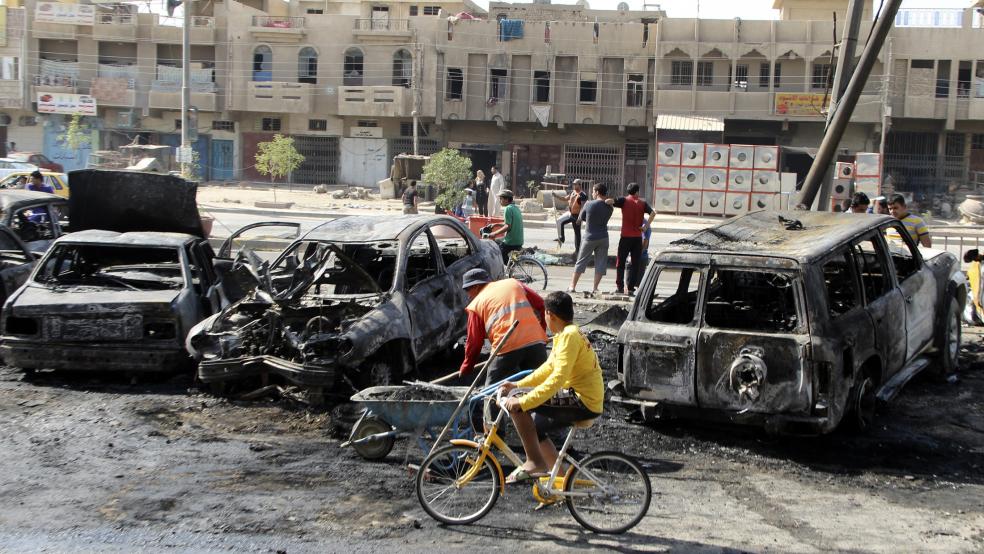The extremist Islamic State of Iraq and the Levant (ISIL), also known as ISIS, has captured a third of Iraq’s territory within a few days. Iraq’s third-biggest city, Mosul, fell within hours of being attacked despite having a government force of around 27,000 troops to defend it.
ISIL is an amalgam of Sunni paramilitary forces that operate in Iraq and Syria. It is the latest and most successful extremist group to emerge in the region and combines former Ba’th era military officers, former Al-Qaeda members and fundamentalists from countries energised by the Arab Spring. Alienated Muslims from the West have also been attracted by the achievements of ISIL in Syria’s civil war.
Related: Iraq Unrest Drives Concerns on Oil Spike
Recent territorial gains by ISIL mean the group controls practically the entire Sunni majority regions of Iraq along the Syrian frontier. How could a rebel force of fewer than 10,000 fighters defeat Iraq’s security apparatus of over a million personnel? Can Iraq’s elected government overcome this threat to its authority and very existence?
Why Has Iraq's Military Failed?
A new Iraqi army was re-established from militia members and low-ranking members of the Ba’th army when it was dissolved in 2003. Senior officers in Saddam Hussein’s forces were dismissed, which gave rise to at least two security issues. Firstly, military officers of the previous army were steered towards terrorist groups. Secondly, Iraq’s new military suffered from the loss of expertise and military discipline instilled by their former officers.
As a result, Iraq’s army lacks the essential expertise and discipline to fight a terrorist group. ISIL fighters in most situations have superior combat experience to the government’s better-equipped forces.
The lack of an effective intelligence agency in Iraq has also enabled ISIL to infiltrate the army. Additionally, political leaders who make the final decisions on military operations are typically inefficient, as the government does not have a clear vision, strategy and effective tactics to overcome national problems.
Related: Obama Just Can't Shake War in Iraq
Poor governance has led to widespread corruption in both political and military spheres. Military personnel are routinely reported to be soliciting bribes, especially in Sunni areas of Iraq.
One of the most dramatic and comical examples of corruption was a recent $85 million contract to acquire ADE 651 bomb-detection devices. At $40,000 per unit it was later revealed that the delivered sonar was a hoax, not more than a child’s toy.
The British government intervened by suspending production, closing the manufacturing company and investigating the contractor, Jim McCormick; he was sentenced to 10 years' jail in 2013. Despite the ineffectiveness of this military hardware, Iraq’s government still uses these devices without trying to find functional alternatives.
Failure of Transitional Justice
Transitional justice is one of the most important components of the democratisation process in countries such as Iraq, which has suffered from the long-term effects of dictatorship followed by violent sectarianism. This project has been another policy failure by Iraq’s new government.
Iraq’s elected government officials have tried and punished a few prominent criminals associated with the former regime. They have, however, neglected other aspects of the transitional justice process: truth-seeking, national reconciliation and the combatting of sectarianism and discrimination.
Related: How Squandered U.S. Money Fuels Iraq's Insurgents
Sunni Iraqis now experience the same issues that Shiites used to endure under Saddam Hussein’s regime. Significant numbers of Sunnis are imprisoned without charge. National and international organisations report a variety of human rights violationsinvolving the government. High rates of sectarianism and discrimination are perpetrated against Sunnis by military forces.
Iraq’s government also discriminates in favour of Shiite militias to the detriment of Sunni militias. The government permits Shiite militias to operate freely across Iraq and Syria and does not consider them terrorists. Some, such as Al-Asaeb, even operate as government allies.
At the same time, the government suppresses any kind of Sunni opposition militia groups – including some civilian-dominated ones. This has all led to a widespread discontent among Sunni people. They may not subscribe to ISIL, but welcome any alternative to their current situation.
Iraq As Regional Sectarian Warfront
Iraq has become a battleground for competing sectarian interests in the Middle East. Saudi Arabia and Qatar have thrown their support behind Sunni militias in Iraq to pressure Iran and distract it from supporting Bashar al-Assad in Syria. Iran, for its part, has stuck to extremist Shiite parties, showing no tolerance towards moderate Sunni or even moderate Shiite parties.
This has led to the opening of a deadly rift within Iraqi society. Sunnis accuse Shiites of following Iranian agendas. Shiites accuse Sunnis of being the fifth column of Saudi Arabia and Qatar because they do not want to live under the rule of the Shiite majority in their own country. Even though ISIL cannot maintain its recently gained territory, the current situation is far from optimistic and remains very fragile. Serious problems resulting from decades of dictatorship have combined with the issues arising from a failed new regime.
At the same time, the solution of dividing the country along sectarian lines is rejected by vast numbers of Iraqis, who want to live in a united Iraq. The continued existence of common Sunni-Shiite areas makes any carve-up of Iraq along sectarian lines a very painful and bloody process – one that ISIL’s victories may have initiated.
Ali Mamouri does not work for, consult to, own shares in or receive funding from any company or organisation that would benefit from this article, and has no relevant affiliations.
This article originally appeared in The Conversation. Read the original article.




